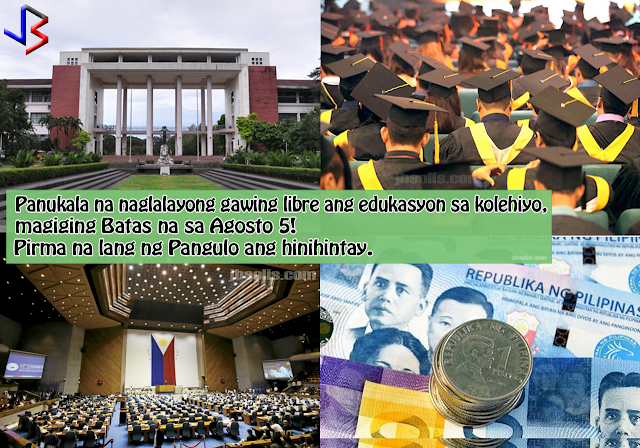Good news for students and parents in the Philippines. Senate Bill No. 1304 or the “Free Higher Education for All Act" has just been approved by the Senate, and was already transmitted to the Office of the President for approval last July 5. Unless President Rodrigo Duterte vetoes or signs it earlier, then the measure would automatically lapse into law after 30 days or on August 5. The law would provide tuition subsidies and financial assistance to students in state universities and colleges (SUCs) and private higher learning and vocational institutions.
“In line with the mandate of our Constitution, the State must uphold the right of all citizens to quality education at all levels,” Senator Bam Aquino said in a speech when he sponsored the bill on the floor as former chair of the Senate committee on education, arts and culture.
So who are to benefit when the bill is signed by the President into law?
“In line with the mandate of our Constitution, the State must uphold the right of all citizens to quality education at all levels,” Senator Bam Aquino said in a speech when he sponsored the bill on the floor as former chair of the Senate committee on education, arts and culture.
So who are to benefit when the bill is signed by the President into law?
Under the bill, all Filipino citizens currently enrolled in State Colleges and Universities and other similar institutions, as well as those who will enroll in the future in courses in pursuance of a bachelor’s degree, certificate degree, or any comparable undergraduate degree in any SUC can qualify for the tuition subsidy “provided that they meet the admission requirements of the SUC.”
Similarly, students in private institutions can also avail of a "subsidized loan" to fund their education. Requirements are set by the bill.
However, people who had attained a prior bachelor’s degree or any equivalent degree, had been discharged from any higher education institution for whatever reason, or those who “failed to complete their degree or program within a year after the prescribed period in their program” would be “ineligible for the proposed tuition subsidies.”
For example, to enjoy the free tuition, a student taking a four-year course must finish it or graduate within five years or lose the benefit. This will dissuade students from shifting courses and motivate them to finish their studies.
According to statistics, there are 645,566 students in the country’s SUCs and it would likely cost the government about P16 billion annually to make tuition fees free across these institutions, noting that the annual weighted average tuition in SUCs is about P10,000 per year.
Just a few months ago, the government announced the allocation of about P8 Billion pesos in budget to fund the free tuition fees of various SCUs in the country for 2017. Sen. Aquino was criticized for falsely claiming credit for the P8 Billion allocation. It was actually Sen. Lacson who discovered the amount as pork barrel of the DPWH. The Senate then moved to realign the money for education.
source: Inq, PTV
Just a few months ago, the government announced the allocation of about P8 Billion pesos in budget to fund the free tuition fees of various SCUs in the country for 2017. Sen. Aquino was criticized for falsely claiming credit for the P8 Billion allocation. It was actually Sen. Lacson who discovered the amount as pork barrel of the DPWH. The Senate then moved to realign the money for education.
source: Inq, PTV
©2017 THOUGHTSKOTO
SEARCH JBSOLIS, TYPE KEYWORDS and TITLE OF ARTICLE at the box below



